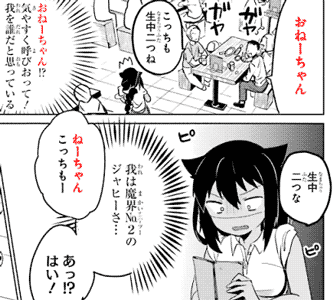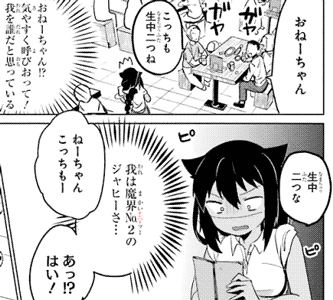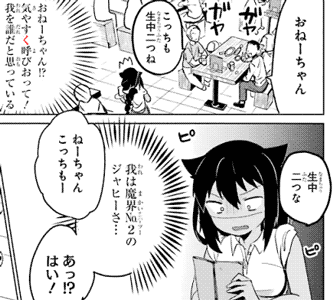Manga: Jahy-sama wa Kujikenai!, ジャヒー様はくじけない! (Chapter 0.1, ジャヒー様とすまいる)
Translation
- Context: Jahy-sama works as a waitress.
- oneechan, kocchi mo nama-chuu futatsu ne
おねーちゃん こっちも生中2つね
Missy, two beers here, too.- nama-chuu - from nama-biiru 生ビール, "raw beer," as in "draft beer," in a a jug of "medium," chuu 中, size.
- gaya gaya
ガヤガヤ
*noisy crowd.* - oneechan!? ki-yasuku yobi-otte! ware wo dare da to omotte-iru
おねーちゃん!?気やすく呼びおって!我を誰だとおもっている
Missy?! Calling [me] so casually! Who does [he] think I am?- ki-yasui - relaxed, familiar, casual, as opposed to formal.
- yobi-otte - te-form of yobi-oru 呼びおる.
- ~oru suffixed to the ren'youkei 連用形 of a verb works similarly to ~yagaru ~やがる, used to say someone "dares" to do something to you, expressing angers or amazement.
- nama-chuu futatsu na
生中2つな
Two beers, right? - pi, pi
ピピ
*writing down.* - ware wa makai nanbaa tsuu no Jahii-sa...
我は魔界No.2のジャヒーさ・・・
I['m] the demon world's number two, Jahy-sa...
- Here, Jahy was about to call herself Jahy-sama. You don't normally use honorific suffixes toward yourself, specially the respectful ~sama ~様, as it sounds pompous. This is typically done by characters that are extremely proud, over-confident, or bossy.
- nanbaa tsuu, the katakanization of "number two," was used as furigana for its abbreviation.
- neechan, kocchi mo~
ねーちゃんこっちもー
Missy, here too~ - a'!? hai!
あっ!?はい!
Ah? [One second]!- hai - "yes," used as an affirmative response in general.
Relevant Articles
-
お姉さん, "plder sister," "young woman."
-
"Who."
-
振り仮名.
-
File Usage
The file oneechan-jahy-sama-ch-zero-point-one.png has been used in the following articles:


